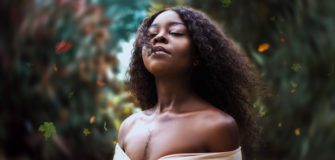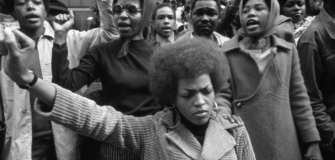Black Beauty: A Reclamation – FUBU
Share
When it comes to portrayals of the beauty of women in mainstream society, Black women have been largely excluded. It is still rare to see a Black woman on the cover of a glossy magazine or walking the runways of fashion shows in New York and Paris. The standard of beauty propagated throughout the world is dominated by the images of Anglo-European women, usually with fair skin and blond hair. And, the rejection or denial of Black women as beautiful or desirable is reinforced by everything from fashion magazines to fairy tales to romantic comedies, where the heroine or love interest is rarely, if ever, in the body of a Black woman.
We are the subject of sexually suggestive songs and videos that reinforce the notion that we are merely sexual freaks whose sole purpose is to appease male sexual desire. We are even compared to animals. And when we attempt to transcend our physicality and shift the discussion to our excellence and accomplishments across countless disciplines, somehow the conversation always finds a way back to our Black bodies.
Michelle Obama, the only First Lady to hold two Ivy League degrees, has been referred to as “a gorilla in heels.” Serena Williams, the winning-est professional athlete of all time, is continually subjected to vile criticism of her body —too strong, too curvy, too suggestive, too masculine, too Black. We cannot win. We cannot escape the scrutiny that maligns our bodies yet also says “up for sale” to the highest bidder.
Black women are the arbiters of style and natural beauty from our elaborate fashion sense to our fly ass hair, yet our contributions are rarely recognized until seen on another body that isn’t Black.
Kinky hair and traditionally African hairstyles on Black women are seen as unprofessional, while the Kardashians are given cover shoots and six-figure paydays for wearing and relabeling our Bantu knots and cornrows ‘mini buns’ and ‘boxer braids.’ And butt implants have replaced breast augmentation as the most requested plastic surgery. This sends the message that it is okay to dismantle the bodies of Black women and wear the parts you find attractive, while never having to value a Black woman as whole. No one celebrates us, so we celebrate each other and our beauty for ourselves, all while enduring the endless onslaught of appropriation and misrepresentation of our images.
In a country that speaks constantly about equality, I’m endlessly assaulted by microaggressions aimed at my beauty and body: jeans not designed for my tiny waist yet full hips; lipsticks that wash out the depth of my rich skin; ashy foundations that stop three shades before my skin tone begins; hair products that do not include my hair’s springy coils; people who fondle my body without asking; men who leer and want to “take care of me,” which is code for possession and ownership of my body; and magazines that showcase romance and beauty with images of people who do not look like me. It is the happy brides in the magazines and romantic comedies who are worthy of fairytale endings—but those women look nothing like me—a Black woman with dark skin and prominent features.
Being a Black woman means learning to define your beauty and worth in a world where so few people are willing to acknowledge or celebrate those qualities in you. In the grand age of social media, Black women are finding and creating visible platforms to display ourselves as whole people. Following other Black women who celebrate their beauty and uniqueness has helped me to unapologetically own and celebrate my wildly thick hair and deep Black skin and ample behind. Social media has brought Black women together and created ways for us to see each other, celebrate each other, claim ourselves and hashtag our magic into visibility. It has connected me to my heritage, my beauty, my worth. And after centuries of our bodies being owned, literally and figuratively, we are finding ways to own our sexuality and celebrate our beauty in all the different hues we possess (thank you Fenty beauty). It feels like a revolution, a reclamation….an awakening. And, I am SO here for it.




Follow Us